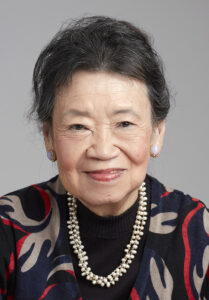
Drawn to the sciences out of a longstanding love of discovering new things, Ru Chih Chow Huang earned a Bachelor of Science from National Taiwan University in 1953 before coming to the United States the following year. She subsequently matriculated at the Virginia Polytechnic Institute and State University, achieving a Master of Science in 1956, and the Ohio State University, where she graduated with a Doctor of Philosophy in 1960. Joining the California Institute of Technology, she completed a postdoctoral fellowship between 1960 and 1965 and co-authored “Histone, A Suppressor of Chromosomal RNA Synthesis,” which was published by the institute in 1962. Having published countless papers since then, Dr. Huang still considers this first paper to be the highlight of her career.
In 1965, Dr. Huang was hired by Johns Hopkins University as an associate professor of molecular biology. She rose to become an associate professor by 1971, and since 1975, she has made a name for herself as a research professor, where her focus is primarily on cancer research. Over the course of her more than 50 years with the university, she has worked with countless groups of doctoral students and postdoctoral fellows on the prevention and treatment of malignant disease. In 2019, Dr. Huang published a paper on her work concerning how cancers develop, and her ultimate goal is to find a treatment that will prevent and halt the spread of cancerous cells.
Alongside her primary responsibilities, Dr. Huang has contributed her skills to various other professional endeavors. In 1980, she served as the chair of the Gordon Research Conferences and further chaired the board of science counselors at the National Institute on Aging from 1980 to 1994. She later spent time with Academia Sinica, first on the board of directors of the Institute of Molecular Biology from 1987 to 1988 and then as a Choh Hao Li memorial lecturer in 2011. She was also a visiting chair professor at National Central University from 2008 to 2012. Today, Dr. Huang is a member of the science advisory board at the National Cancer Institute and maintains professional affiliation with the American Society for Biochemistry and Molecular Biology and the Biophysical Society.
Attributing much of her success to the opportunities she has had to work alongside incredibly bright scientists, Dr. Huang is also deeply grateful to her mentors, Maynard Hale from Virginia Tech, Joe Varner from Ohio State, and James Bonner at Cal Tech. Furthermore, she has made a name for herself for her humility, honesty, and the fact that she is never competitive, all things that have garnered significant respect with everyone around her, from the university president to the janitors. Continually motivated by her genuine fascination with her work, as Dr. Huang looks toward the future, she hopes to continue her research on cancer as well as on the ongoing COVID-19 pandemic, where she has been involved in studies on how to halt the spread of the illness.
For her excellence, Dr. Huang was inducted into the National Academy of Inventors in 2023. She was previously named Woman of the Year in 2011 by the American Biographical Institute and honored among the nation’s Most Respected Teachers from 2003 to 2005. Early on in her career, she was presented with an Outstanding Asian-American Scientist Award and recognized by American Women in Science in 1985. While she has accomplished much over the course of her career, Dr. Huang hopes to cultivate a legacy of research that will live on and continue to help others after she is gone. She would advise young and aspiring professionals to study and learn in disciplines other than their main specialty, as this will allow for increased interdisciplinary knowledge and aid in the development of necessary collaborations.
